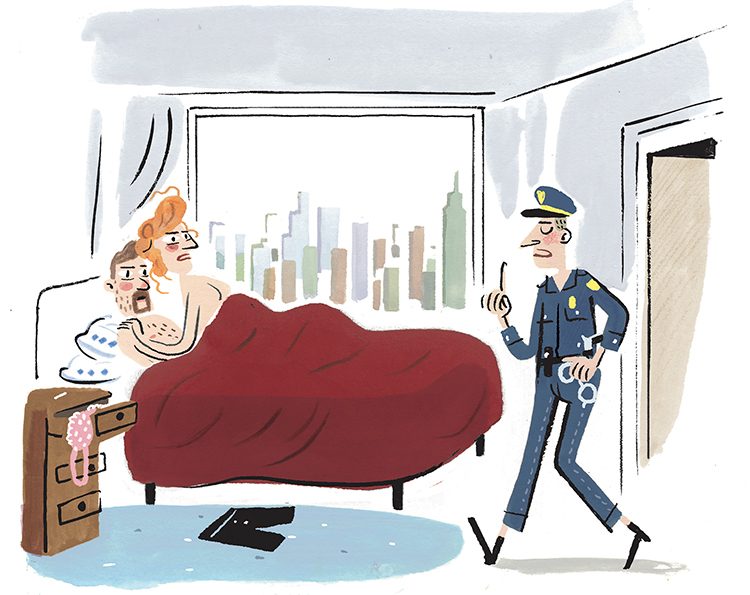It’s a Mad, Mad World
What’s the craziest law on the planet? There’s plenty of competition.

People love to hear about the idiotic legislation that their country and others possess. But when looking further into these supposed laws, it soon becomes clear that many don’t really exist at all, or have long since been repealed, or are phrased in a way that at first seems crazy but in fact makes sense.
There is, of course, plenty of absurd legislation that turns out to be genuinely absurd. So it’s worth sorting out the genuine crazy laws from the ones that are crazy but aren’t real laws … and from those that are real laws but which turn out not to be crazy.
So first up is the widely held notion that it is illegal in France to name a pig Napoleon. It’s certainly true that there was a French law from 1881 that forbade offensive mockery of the head of state during his time in office. But it was passed 66 years after the end of the Emperor Napoleon’s reign, and 11 years after his nephew Napoleon III was deposed, so it could never have applied to pigs called Napoleon while a Napoleon ruled and was not applicable subsequently without a Napoleon as head of state.
In any case, the law was repealed in July 2013 after the European Court of Human Rights ruled that a protester’s rights had been abused when he was fined €30 in 2008 for “offensive mockery” of then-President Nicolas Sarkozy by calling him “a jerk.”

On the other hand, it really is legal in France to marry a dead person, provided that there is evidence that the deceased wished to marry the surviving partner.
The law making this possible was introduced in 1959 after President de Gaulle visited the Provençal town of Fréjus, where a dam had burst, killing hundreds of people. There he met a young woman whose husband-to-be was among the victims. She begged to be allowed to go ahead with her wedding and the law was duly passed.
Dozens of posthumous weddings now take place each year in France, motivated by the simple desire to fulfill the dream of matrimony.
It is also true that aliens from outer space are banned from landing on the world-famous vineyards of Châteauneuf-du-Pape in south-eastern France. In 1954, the local mayor, Lucien Jeune, proclaimed: “Any aircraft, known as flying saucer or flying cigar, which should land on the territory of the community will be immediately held in custody.”
As recently as October 2016 mayor Claude Avril affirmed, “I’m not going to touch the ban.” Well, why should he? Not a single Martian has touched down in Châteauneuf. Alors, the ban has worked!
Over the border in Switzerland, there’s a widespread belief that residents are banned from flushing a lavatory after ten o’clock at night.
This turns out to be half-true. There is no national law on flushing lavatories in Switzerland, but there is legislation requiring householders to be mindful of their neighbors. This is used by Swiss cantons, municipalities, and apartment-building owners to justify rules governing the noise of, for example, high heels on wooden floors, car horns, noisy pets… and late-night lavatories.
That’s not to say that even the sensible, orderly, peaceful Swiss don’t have their own genuinely odd laws hidden away in their statute books.
For example, it is legal in Switzerland to eat a cat or a dog, despite petitions to parliament to outlaw the practice. Fricassée de chat, anyone? No, thought not.
Individual cantons can make their own rules. Hikers are not allowed to pursue their hobby in the nude in the northeastern Swiss canton of Appenzell—a law introduced after the conservative locals became alarmed that the hills and valleys of their picturesque region had become a magnet for naked walkers.
The British, without understanding what the sanction could be, believed it to be illegal to die in the Houses of Parliament. It was voted Britain’s most absurd law in a 2007 poll. But six years later the Law Commission of England and Wales concluded that no such law had ever been passed.
The Commission did, however, note that there is still a statute, dating from 1313, that forbids Members of Parliament from wearing armor in Parliament—no matter how much many an embattled Prime Minister must have wished for a helmet and breastplate.
More prosaically, the Commission also confirms that it is illegal in the capital, London, to carry a plank along a pavement, or fire a cannon within 300 yards of a house; and it is an offense in England and Wales to be drunk in an establishment licensed to sell alcohol, or to be drunk in charge of a horse.
Some of these LAWS sound crazier than perhaps they are. Who, after all, wants to be hit by a plank when the person carrying it turns a corner?
And there’s a good reason why it’s illegal to feed the pigeons in Venice. Pigeons can stuff a lot of food into their stomachs. But that food soon reappears as pigeon droppings, which damage the historic buildings that the people who feed the pigeons have come to see and admire. So the less food the birds eat, the less mess they make and the less damage they cause.

But were the authorities elsewhere in Italy really so sensible to ban spherical fish bowls in Rome, or to insist that all pet dogs in Turin are walked three times a day, and that pets in Reggio Emilia must, by law, receive an equal portion of any shared meal?
And did the mayors of various tourist resorts really have to ban the building of sand castles in Eraclea, or kissing in cars in Eboli, or hanging beach towels out of windows to dry in Lerici, or wearing flip-flops anywhere but the beach in Capri, or strolling through the streets of Vietri sul Mare and Castellamare di Stabia bare-chested, in bikinis, or with “very skimpy clothes”?
In Germany, it seems, the main beef is noise, with stringent rules on anti-social Lärmbelästigung, or noise pollution. An average suburban man elsewhere in Europe might spend his Sunday afternoon mowing the lawn or putting up a bookshelf. But not in Germany, where both drilling and mowing are strictly forbidden on Sundays and on public holidays.
And the country that brought us Bach, Beethoven, Brahms, and Wagner has it in for musical instruments, too. Germany’s Federal Court of Justice has ruled that playing or even tuning instruments is forbidden in rented apartments at any time except from 8 a.m. to noon and from 2 p.m. to 8 p.m.
The nation that appears most frequently accused of legal idiocies is the United States. For example, Lorraine Lorne, associate law librarian of the University of Arkansas Law Library, investigated the constant online suggestions that men in Arkansas were entitled to beat their wives—but only once a month.
She concluded: “No such law was found in any of the Arkansas statutes.” But she goes on to say, “However, the states of Alabama, Arizona, California, South Carolina appear to permit beating one’s spouse within certain limited circumstances … (including) with the permission of the victim!”
Elsewhere in America, visitors to New York should note that section 255.17 of the New York state penal code mandates that extramarital sex is a “class B misdemeanor” that can lead to 90 days in jail or a $500 fine.
In Kentucky, it is forbidden to “sell or exchange, display, or possess living baby chicks, ducklings, or other fowl or rabbits which have been dyed or colored … in any quantity less than six.” In other words, it is a crime to sell one duckling that has been dyed bright blue, but not to sell six blue ducklings.
Heading out into the Pacific, it is illegal in the state of Hawaii to sit at a bar with more than one drink in front of you, unless you can point out the other person for whom you have bought the drink. Incidentally, by law the official state fish of Hawaii is the Humuhumunukunukuapa’a, otherwise known as the reef triggerfish. Just try ordering that in a restaurant, with or without two drinks in front of you.
The mania for crazy laws is spreading all over the world like a legislative virus.

In Singapore, the importation, sale and use of chewing gum has been illegal since 1992, unless the gum has proven medicinal qualities.
In Saudi Arabia, the Commission for the Promotion of Virtues and Prevention of Vice has made it a crime for men to walk their dogs or their cats in the street, for fear that they will use their pets to help them make advances to passing women.
China, meanwhile, has its sights set on heaven. Buddhist monks in Chinese-occupied Tibet intent on achieving nirvana may not be reincarnated after their death unless they file a Reincarnation Application to the Chinese State Religious Affairs Bureau.
For its sheer, rampant legal lunacy, the prize for craziest law in the world surely goes to a passage in Australia’s Goods and Services Act (1999), dealing with “a new tax system.” This law is not just crazy, it explicitly defies reality, creating a surreal world in which up is down and black is white, as follows …
“The Commissioner may treat a particular event that actually happened as not having happened, and treat a particular event that did not happen as having happened, and treat an event that actually happened as having happened at a time different from the time it actually happened.” Now that really is crazy!



